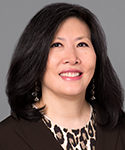 By Cyndie M. Chang
By Cyndie M. Chang
It means resilience. One of the reasons we celebrate Asian Pacific American Heritage in May is to mark the anniversary of the completion of the transcontinental railroad in May 1869. The majority of the workers who laid the tracks were Chinese immigrants, and one of them was my great great grandfather. Since then, Asians and Pacific Islanders immigrated to the United States and have made significant contributions to our country. My great great grandpa worked under dangerous conditions to build something, in a literal and figurative sense. He was not only building the railroad, but establishing a better life here for his family.
That eventually led to the opportunity for my grandpa and his partners to start a humble little Chinese restaurant in 1935 serving the Japanese American community. The Far East Café neon sign that says “Chop Suey” is still lit up in what is now called Little Tokyo in Los Angeles. My dad bused tables there while Mom was in nearby Chinatown, where she was a seamstress at a sewing factory. After WWII and the internment camps, many Japanese Americans came back home to nothing, but they returned to the Far East Cafe that continued to serve families needing to rebuild. Apparently, the Far East Cafe was popular to generations of Japanese Americans who wanted to celebrate weddings, birthday parties, and other milestones. If one didn’t have enough money to pay for a meal, that was OK there cause you could just wash dishes or you’d make it up next time because there was an understanding that we all had to stick together and look out for each other in hard times. While the restaurant had great starchy Chinese food, its greater significance was it being an informal hub of the Japanese American community after the camps. And, the building is now designated a National Historic Landmark.
Fast forward, I persevered to be the first lawyer in my family. I became the president of the National Asian Pacific American Bar Association (NAPABA) in 2016-2017. At the time, there was a resurgence of anti-immigrant racism and hate crimes. NAPABA led hate crime advocacy and coordinated with other bar organizations on civil rights issues. I was proud to lead NAPABA then being an American with deep immigrant roots of six generations overcoming racism and hate, including the worst kind of hatred — I no longer have an uncle because a white supremacist took his life decades ago due to a hatred for others of a different skin color.
There is resilience in generations before me and the Asian American community. From the Chinese Exclusion Act to the Japanese Internment camps to the xenophobia after 9/11 against Muslims/South Asians to the continued racism in recent times, Asian Americans continue to face being the perpetual foreigner. I embrace and appreciate the stories of resilience from my family and from others. All of us have stories of overcoming adversity and I hope that this global pandemic gives everyone a deeper appreciation and respect of our collective experiences. What is important from these stories is how we’ve overcome challenges, and how those stories drive what we do every day in setting a path for this generation and for those who come after us.
*This series has been created to celebrate Asian Pacific American Heritage Month.


 By
By